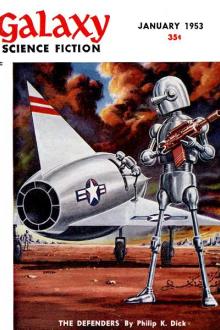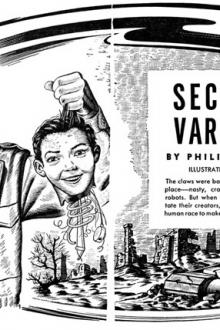Short Fiction, Philip K. Dick [best large ereader .txt] 📗

- Author: Philip K. Dick
Book online «Short Fiction, Philip K. Dick [best large ereader .txt] 📗». Author Philip K. Dick
The guard departed.
“I don’t want anything to happen to you,” Sherikov said. “Before we go on I’ll have you checked over. And deloused at the same time.”
Cole said nothing.
Sherikov laughed. “Buck up! You have no reason to feel bad.” He leaned toward Cole, jabbing an immense finger at him. “Another two hours and you’d have been dead, out there in the mountains. You know that?”
Cole nodded.
“You don’t believe me. Look.” Sherikov leaned over and snapped on the vidscreen mounted in the wall. “Watch, this. The operation should still be going on.”
The screen lit up. A scene gained form.
“This is a confidential Security channel. I had it tapped several years ago—for my own protection. What we’re seeing now is being piped in to Eric Reinhart.” Sherikov grinned. “Reinhart arranged what you’re seeing on the screen. Pay close attention. You were there, two hours ago.”
Cole turned toward the screen. At first he could not make out what was happening. The screen showed a vast foaming cloud, a vortex of motion. From the speaker came a low rumble, a deep-throated roar. After a time the screen shifted, showing a slightly different view. Suddenly Cole stiffened.
He was seeing the destruction of a whole mountain range.
The picture was coming from a ship, flying above what had once been the Albertine Mountain Range. Now there was nothing but swirling clouds of gray and columns of particles and debris, a surging tide of restless material gradually sweeping off and dissipating in all directions.
The Albertine Mountains had been disintegrated. Nothing remained but these vast clouds of debris. Below, on the ground, a ragged plain stretched out, swept by fire and ruin. Gaping wounds yawned, immense holes without bottom, craters side by side as far as the eye could see. Craters and debris. Like the blasted, pitted surface of the moon. Two hours ago it had been rolling peaks and gulleys, brush and green bushes and trees.
Cole turned away.
“You see?” Sherikov snapped the screen off. “You were down there, not so long ago. All that noise and smoke—all for you. All for you, Mr. Variable Man from the past. Reinhart arranged that, to finish you off. I want you to understand that. It’s very important that you realize that.”
Cole said nothing.
Sherikov reached into a drawer of the table before him. He carefully brought out a small square box and held it out to Cole. “You wired this, didn’t you?”
Cole took the box in his hands and held it. For a time his tired mind failed to focus. What did he have? He concentrated on it. The box was the children’s toy. The inter-system vidsender, they had called it.
“Yes. I fixed this.” He passed it back to Sherikov. “I repaired that. It was broken.”
Sherikov gazed down at him intently, his large eyes bright. He nodded, his black beard and cigar rising and falling. “Good. That’s all I wanted to know.” He got suddenly to his feet, pushing his chair back. “I see the doctor’s here. He’ll fix you up. Everything you need. Later on I’ll talk to you again.”
Unprotesting, Cole got to his feet, allowing the doctor to take hold of his arm and help him up.
After Cole had been released by the medical department, Sherikov joined him in his private dining room, a floor above the actual laboratory.
The Pole gulped down a hasty meal, talking as he ate. Cole sat silently across from him, not eating or speaking. His old clothing had been taken away and new clothing given him. He was shaved and rubbed down. His sores and cuts were healed, his body and hair washed. He looked much healthier and younger, now. But he was still stooped and tired, his blue eyes worn and faded. He listened to Sherikov’s account of the world of 2136 AD without comment.
“You can see,” Sherikov said finally, waving a chicken leg, “that your appearance here has been very upsetting to our program. Now that you know more about us you can see why Commissioner Reinhart was so interested in destroying you.”
Cole nodded.
“Reinhart, you realize, believes that the failure of the S.R.B. machines is the chief danger to the war effort. But that is nothing!” Sherikov pushed his plate away noisily, draining his coffee mug. “After all, wars can be fought without statistical forecasts. The S.R.B. machines only describe. They’re nothing more than mechanical onlookers. In themselves, they don’t affect the course of the war. We make the war. They only analyze.”
Cole nodded.
“More coffee?” Sherikov asked. He pushed the plastic container toward Cole. “Have some.”
Cole accepted another cupful. “Thank you.”
“You can see that our real problem is another thing entirely. The machines only do figuring for us in a few minutes that eventually we could do for our own selves. They’re our servants, tools. Not some sort of gods in a temple which we go and pray to. Not oracles who can see into the future for us. They don’t see into the future. They only make statistical predictions—not prophecies. There’s a big difference there, but Reinhart doesn’t understand it. Reinhart and his kind have made such things as the S.R.B. machines into gods. But I have no gods. At least, not any I can see.”
Cole nodded, sipping his coffee.
“I’m telling you all these things because you must understand what we’re up against. Terra is hemmed in on all sides by the ancient Centauran Empire. It’s been out there for centuries, thousands of years. No one knows how long. It’s old—crumbling and rotting. Corrupt and venal. But it holds most of the galaxy around us, and we can’t break out of the Sol system. I told you about Icarus, and Hedge’s work in F.T.L. flight. We must win the war against Centaurus. We’ve waited and worked a long time for this, the moment when we can break out and





Comments (0)